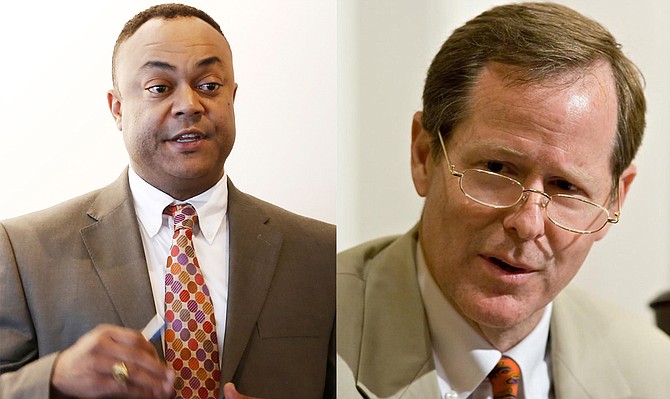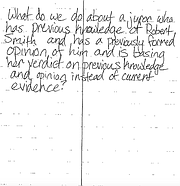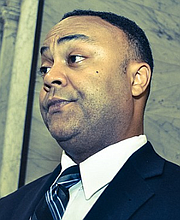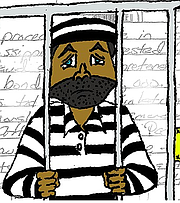Hinds County District Attorney Robert Shuler Smith (left) may have used subpoenas as a way to force Circuit Court Judge Jeff Weill (right) to recuse himself from Christopher Butler’s cases, one lawyer says. Smith is under felony and misdemeanor indictment for his actions. Photo by Imani Khayyam.
JACKSON — The jury in the State of Mississippi's case against Hinds District Attorney Robert Shuler Smith only deliberated about three hours before the judge declared a mistrial at about 4 p.m. today. Today he set a retrial for June 12.
The DA Files
An archive of reporting on controversies surrounding Hinds County district attorneys, present and past.
This means that the State could choose to retry Smith on the charges, as could the federal government, which helped investigate him for trying to keep Christopher Butler from standing trial. Butler is accused of drug charges and, later, wire fraud and embezzlement at his place of employment, Mega Mattress in Jackson. Smith has long maintained Butler's innocence and used various means to try to keep him from standing trial—methods the attorney general's office says violates state law.
After the judge announced the mistrial, Smith's attorney James Waide told the Jackson Free Press after leaving the judge's chambers that he was “feeling good" about the outcome.
“Robert’s a close personal friend of mine, so I am relieved for him, but I am also disappointed we didn’t get a verdict,” he said. “... It was a very trying trial, a very complex trial.”
The jury had sent a couple notes out to Special Judge Larry Roberts at about 2:30 p.m. He told the re-assembled participants and media that notes from the jury are the "worst nightmare" of a judge. They often indicate that they are having trouble reaching a verdict and that a mistrial may be close at hand, leaving the outcome in limbo with no acquittal or conviction and the possibility of starting over looming.
The first note asked for clarity on the meaning of the word "conspiracy," which is related to Smith's charges. The judge answered the note back to the jury.
But the second note caused more consternation for the judge and the attorneys, leading the attorney general's office to ask that one of the jurors be replaced, indicating that she had misled the court about not knowing the defendant.
“What do we do about a juror who has previous knowledge of Robert Smith and has a previously formed opinion of him and is basing her verdict on previous knowledge and opinion instead of current evidence?” the handwritten note read.
Roberts, a retired court of appeals judge, said, "I just don't know what to do," adding that he didn't know if replacing the juror would solve the problem.
Smith's attorney, Jim Waide, said to the judge that it appears the juror might have had an opinion of Smith going into the case and that the person might have influenced the whole jury. Waide said that the juror holding back that information until the end could cause a mistrial. It is unclear so far whether Smith knew the juror.
Waide said he did not want a mistrial but did not see another solution. Roberts said he would not replace the juror—the jury had alternative jurors present throughout the trial—unless both parties agree, which Waide said he would not. Smith's attorney said the judge should tell the jury to focus only on the evidence from witnesses, and "no other information," and the State agreed.
Butler Says MBN Framed Him
A Jackson man says MBN framed him for drug charges, which the agency vehemently denies. Illustration by Zeakyy Harrington
Soon the judge sent new typed instructions, developed with the attorneys for both sides, back to the jury and told them to keep deliberating, choosing not to replace the juror.
The bailiff then checked on the current count of guilty-not guilty among the juror and told the judge that on the first count the jury was tied 6-6 and then 8-4 on the second, not revealing whether it was eight for acquittal or conviction. The judge then kicked everyone out of the courtroom again.
Almost immediately, the judge received another note from the jury saying it was deadlocked. "We the jury are unable to reach a verdict," Robert read from the note.
Roberts then called the jury back in, asking them to raise their hands if they believed further deliberation would help. None raised a hand, and the judge declared a mistrial. (A unanimous vote is required for a conviction or an acquittal.)
Waide said after the verdict that he could not explain what happened with the juror who might have known or had an opinion about Smith that he had not revealed before deliberation. “There was a comment that came out that a juror had some prior opinion, some prior dealings, with Robert,” Waide told the Jackson Free Press.
“Don’t know anything about the juror,” he added.
Attorney General Jim Hood sent a statement to the Jackson Free Press containing harsh words for the juror who withheld the information about knowing Smith.
"I am disappointed that the jury was deadlocked in this case, but a mistrial was the only appropriate result after learning that a juror sat silently during jury questioning before the trial, even though that juror knew the defendant. Unfortunately, we learned after a 2-1/2 week trial that a juror talked during deliberations about having known the defendant," Hood stated.
"A juror takes an oath to answer questions posed to them by the Court and the lawyers. Consequently, this case will need to be presented to another Hinds County jury as soon as possible. Any inappropriate conduct will be appropriately addressed. Jury service is the responsibility for all of us as citizens, and justice in any jurisdiction depends upon the integrity, courage and honesty of the citizens who sit on juries."
The juror who withheld previous knowledge about Smith can face legal ramifications, including jail time and court costs, for not providing the information.
Read full coverage of the events leading up to the trial and the trial itself at jfp.ms/DAFiles.
This is a developing story with regular updates. Please check back. Email city reporter Tim Summers Jr. at [email protected] with information or story tips and follow him on Twitter at @tims_alive for breaking updates.






Comments
Use the comment form below to begin a discussion about this content.
comments powered by Disqus